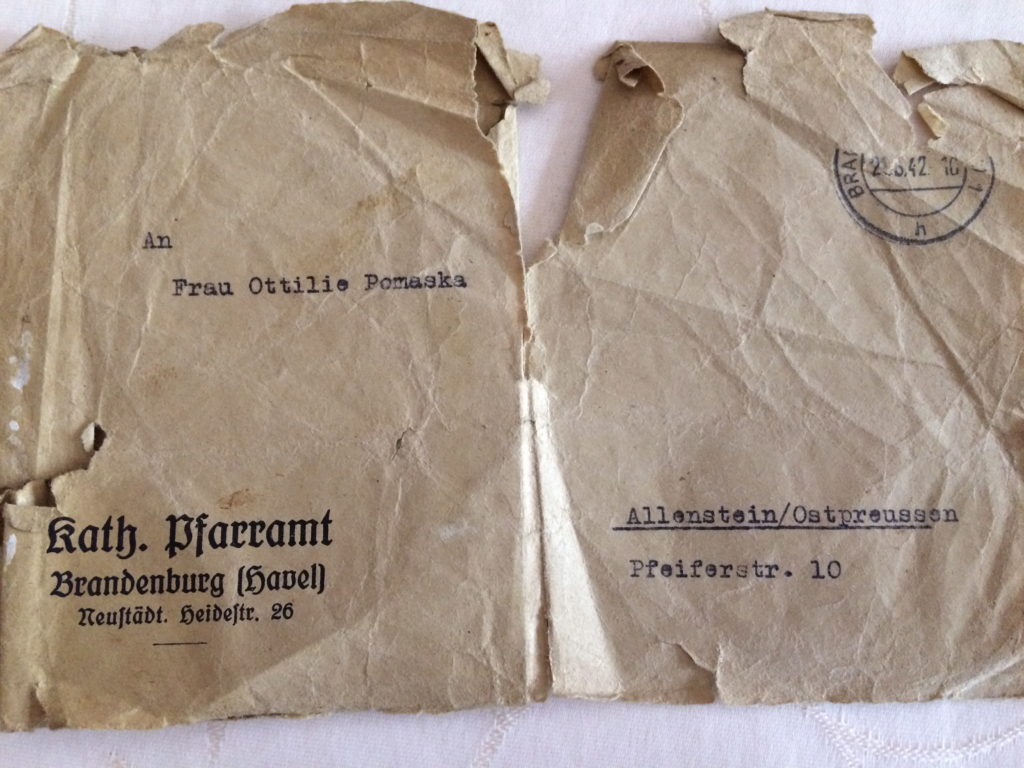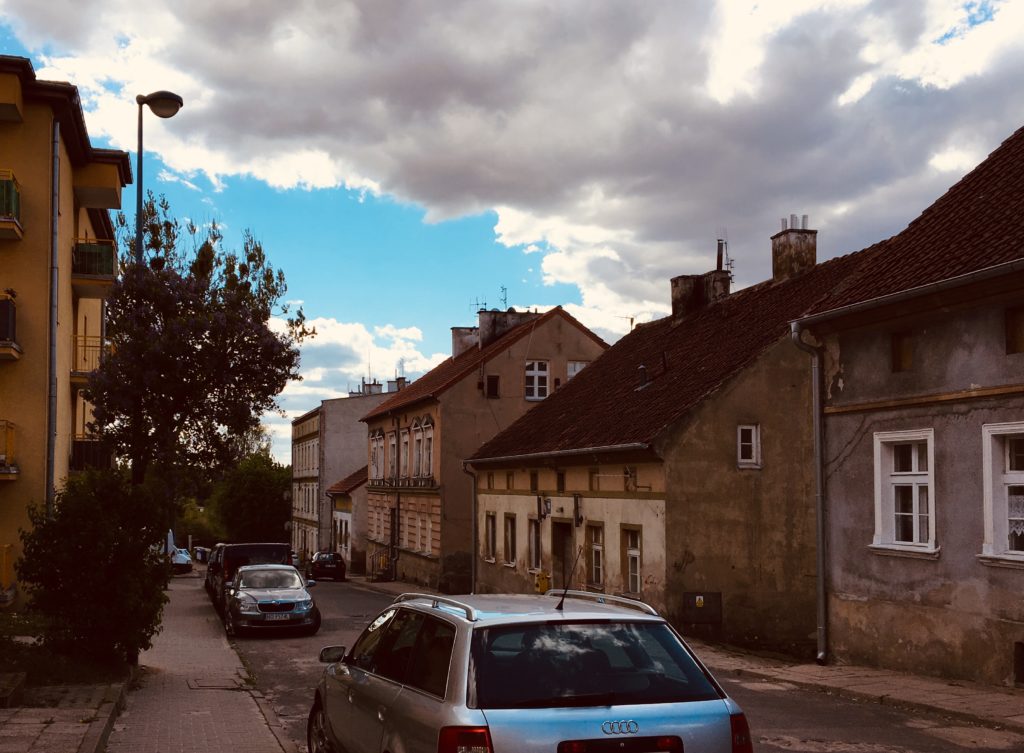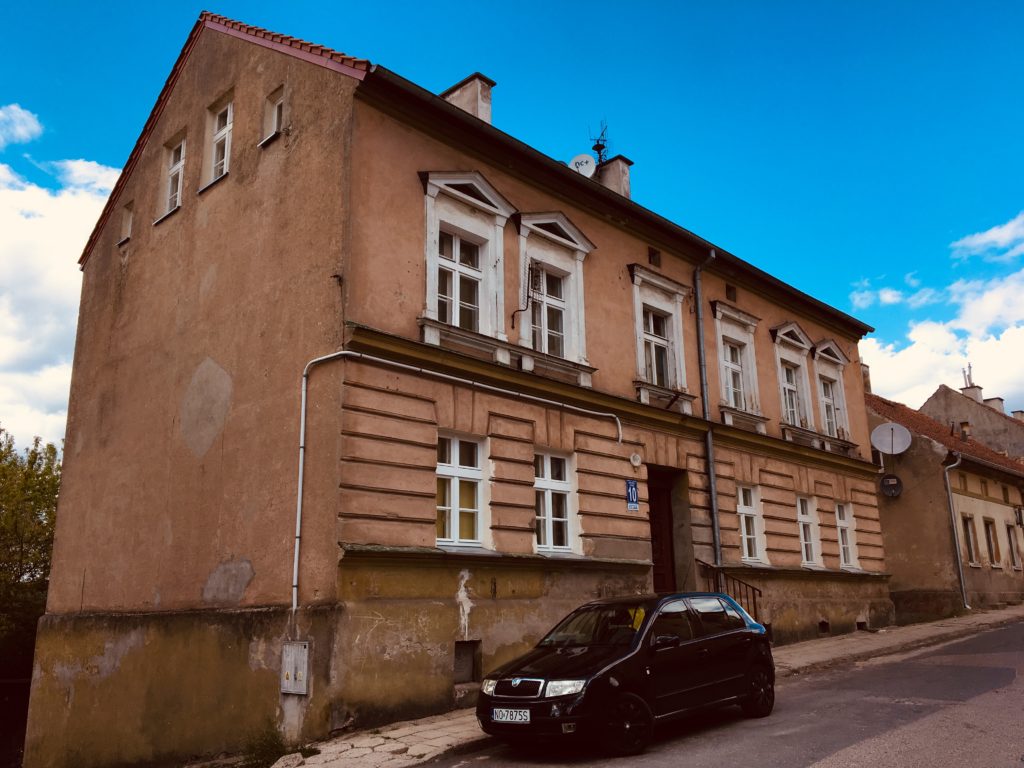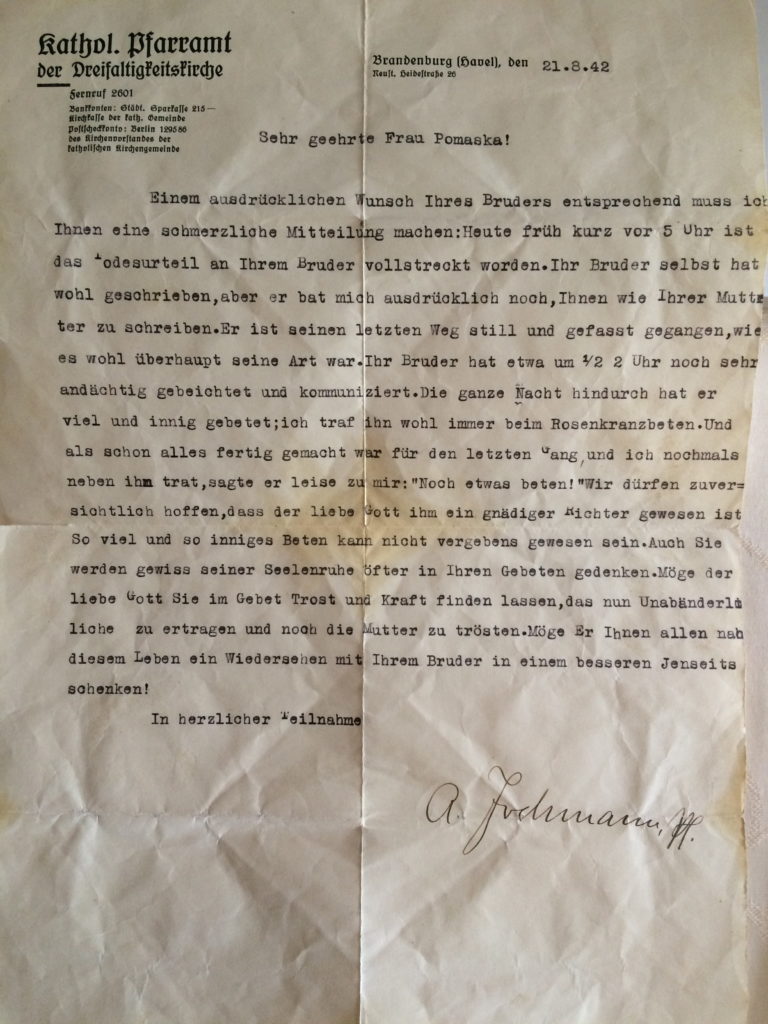
Ich komme Franz näher. Nicht nur, weil ich dank der Bibliotheken und Archive von Allenstein/Olsztyn und meinen Lesern mehr Details über ihn und seine Zeit in der Stadt herausgefunden habe, sondern auch weil ich jetzt mehr konkrete Orte in der Stadt habe, die mich mit ihm verbinden. Einer dieser Orte ist Haus Nummer 10 in der Królowej Jadwigi-Straße, der ehemaligen Pfeifferstraße.
Einige Mitglieder meiner Familie zogen nach Allenstein/Olsztyn, vor allem die Schwestern von Franz und meiner Großmutter Cilly, nachdem sie geheiratet hatten. Eine von ihnen war Ottilie Nerowski. Ottilie heiratete in den 30er Jahren Emil Pomaska, dessen Familie eine Fuhrhaltung und Spedition besaß. Zusammen lebten sie in der Pfeifferstraße 10 in einem Haus, das die Familie gebaut hatte. Hier wurde 1941 meine Großcousine Gisela geboren. Gisela, die einer meiner Hauptansprechpartner für unsere Familiengeschichte ist und heute in Kaiserslautern lebt, hat mir die Geschichte des Hauses erzählt, als ich erwähnte, dass es heute noch steht, parallel zum ehemaligen jüdischen Friedhof und dem Mendelsohn-Haus.

Die Ställe und Garagen des Geschäfts ihres Vaters befanden sich hinter dem Haus und die Familie hatte ein angenehmes Leben in Allenstein/Olsztyn. Giselas Mutter und ihre Geschwister flohen jedoch 1945 vor der Roten Armee, wurden von den Truppen eingeholt und kehrten nach einigen Wochen in die Stadt zurück. Dort stellten sie fest, dass das Haus bereits polnischen Siedlern aus dem Osten zugewiesen worden war und mussten stattdessen in eine Einzimmerwohnung umziehen – als fünfköpfige Familie. Giselas Vater kehrte 1947 aus der Kriegsgefangenschaft zurück und die Familie durfte in die Pfeifferstraße 10 zurückkehren, wo sie bis 1963 lebten. Emil fühlte sich in Polen nie zu Hause (im Gegensatz zu seinen Kindern, die hier zur Schule und Uni gingen, Freunde hatten und sich – in Giselas Fall – sogar in Allenstein/Olsztyn verlobten) und in diesem Jahr gelang es ihm schließlich, das Haus der Familie gegen Pässe und Ausreisegenehmigungen einzutauschen und mit der Familie nach Rheinland-Pfalz zu ziehen.
Davor war die Pfeifferstraße ein Haus, das Franz oft besucht haben muss, und hier erhielt seine Schwester im Jahr 1942 die Nachricht von seinem Tod – durch einen Brief von Albrecht Jochmann, dem Kaplan des Zuchthauses Brandenburg-Görden, in dem Franz hingerichtet wurde. Er schrieb in seinem Brief, dass Franz in seiner letzten Nacht auf Erden: „.. viel und innig gebetet [hat]; ich traf ihn wohl immer beim Rosenkranzbeten. Und als alles schon fertig gemacht war für den letzten Gang und ich nochmals neben ihn trat war, sagte er leise zu mir: ‚Noch etwas beten!‘ Wir dürfen zuversichtlich hoffen, dass der liebe Gott ihm ein gnädiger Richter gewesen ist. So viel und so inniges Beten kann nicht vergebens gewesen sein.“

Franz: Pfeifferstraße 10
I’m getting closer to Franz. Not only because I have – thanks to both the libraries and archives of Olsztyn and my readers – discovered more details about him and his time in the city, but also because I now have more, concrete places in the city that connect me to him. One of those is house number 10 in Królowej Jadwigi street, the former Pfeifferstraße.
Some members of my family lived in Olsztyn, especially the sisters of Franz and my grandmother after they married. One of them was his sister Ottilie Nerowski. In the 1930s, Ottilie married Emil Pomaska, who’s family owned a shipping company. Together they lived at Pfeifferstraße 10, in a house that the family had built. It was here that my great-cousin Gisela was born in 1941. Gisela, who lives in Kaiserslautern today, has over the years become one of my main contacts when it comes to family history, told me the story of the house when I mentioned to her that it still stands today, near the former Jewish cemetery and the Mendelsohn House.
The stables and garages of her father’s business were located behind the house, and the family had a comfortable life in Olsztyn. However, Gisela’s mother and her siblings fled from the Red Army in 1945, but were overtaken and returned to Olsztyn after a few weeks. There, she found that the house had already been assigned to Polish settlers from the east, and had to move to a one-room flat in town instead – as a family of 5. Gisela’s father returned from captivity as a POW in 1947, and the family was allowed to return to Pfeifferstraße 10, where they lived until 1963. Emil never felt at home in Poland (as opposed to his children who went to school and college here, had friends and – in Gisela’s case – even got engaged in Olsztyn), and so he finally managed to exchange the family home for passports and an exit permit for the whole family in that year.
But before all that, Pfeifferstraße was a house that Franz visited often, and it is here that his sister Ottilie received news of his death in 1942 – through a letter sent by Albrecht Jochmann, the chaplain of the prison in Brandenburg-Görden where Franz was executed. He wrote that through his last night Franz: ‚..prayed profound and deeply; I always encountered him praying with the rosary. And when everything had been made ready for the last walk and I stepped in next to him he whispered to me:“Let’s pray a bit longer!“ We can hope confidently that God was a merciful judge to him. So much and profound prayer cannot have been in vain.‘ I’ve added the full English translation of the letter below.

Catholic Parish Office
of the Trinity Church
Long-distance call 2601
Bank accounts: City Bank 215 –
Church bank of the Catholic parish
Post cheque account: Berlin 1295 86
of the board of the Catholic Church parish
Brandenburg (Havel), 21.8.42
Neust. Heidelstrasse 26
Dear Madam Pomaska
Following the expressed wish of your brother I have to deliver a painful message to you: this morning just before 5 am the death sentence of your brother has been carried out. Your brother himself wrote a letter, but he explicitly requested me to write to both you and your mother. He made his final walk quiet and with composure, just like indeed it has always been his manner. Your brother still very piously prayed and communed at 1.30 am. Throughout the whole night he prayed profound and deeply; I always encountered him praying with the rosary. And when everything had been made ready for the last walk and I stepped in next to him he whispered to me:“Let’s pray a bit longer!“ We can hope confidently that God was a merciful judge to him. So much and profound prayer cannot have been in vain. I am sure that you will think of his eternal rest often in your prayers. May the dear Lord grant you solace and strength in your prayers to accept the irrevocably and also to give comfort to your mother. May he give all of you a reunion with your brother in a better hereafter!
In deepest sympathy
A. Jochmann


Fascinating and heart touching. Thank you for sharing. Do you, by any chance, have a full English translation of the letter (or did I miss that somehow)?
P.S. One of the few things that I know about my own family from PL (Wrzesnia, near Poznan), is that my paternal great grandfather’s name was also Franciszek. You don’t often hear that name these days, I wonder how common it was back then?
Franciszek became fifth most popular name in Poland in 2018 🙂
Najpopularniejsze imiona dla chłopców 2017/2018 to:
– Antoni – (9794)
– Jakub (9099)
– Jan (8546)
– Szymon (8131)
– Franciszek (6956)
Dear Jola, thanks a lot for your message. I’ve added a full English translation of the letter now.